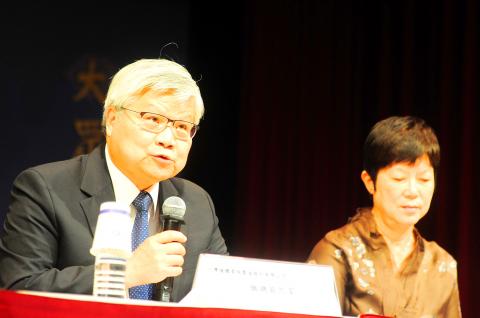Taiwan Semiconductor Manufacturing Co (TSMC, 台積電), the world’s largest contract chipmaker, yesterday said that it has fully recovered from a computer virus that struck the company on Friday evening last week.
Projected costs arising from the incident have been lowered to 2 percent of this quarter’s revenue, down from a previous forecast of 3 percent on Sunday, TSMC told a news conference at the Taiwan Stock Exchange in Taipei.
Gross margin would fall by 1 percentage point due to the cost of remedying the disruption to production, the company said.

Photo: Wang Yi-sung, Taipei Times
TSMC had previously forecast revenue of US$8.45 billion to US$8.55 billion for the third quarter, meaning losses would range from US$169 million to US$171 million, while gross margin is expected to be between 47 and 49 percent this quarter, down from its earlier guidance of 48 to 50 percent.
TSMC confirmed that the virus, which affected its fab tools, was a variant of the WannaCry ransomware worm.
TSMC said the incident occurred when new equipment was installed and connected to the company’s private network without first being scanned in an isolated system and cleared of viruses.
The WannaCry worm, which is known for its ability to spread rapidly, infected other fab tools at other plants via the company’s private network, TSMC said.
The advanced 7-nanometer fabs took the longest to recover from the virus, it said.
“The incident was caused entirely by a failure to follow protocol,” TSMC chief executive officer C.C. Wei (魏哲家) said, denying rumors it was a targeted cyberattack, the work of an internal agent or an act of sabotage via a USB drive.
Wei said the company has not received any ransom demands and none of its data were encrypted by the virus.
“We are in the process of revamping our security protocols, which would remove the possibility of such an error recurring,” Wei said, adding that the new system would be hardwired to block unverified nodes from connecting to the company’s private network.
“We do not expect these security upgrades to greatly affect operating expenses,” Wei said.
It is difficult to ensure that all of the company’s Windows 7 machines have been updated with the latest security patches, as the process requires collaboration with equipment suppliers and can only be performed during downtime, he said.
Wei declined to identify the fab tool that was initially affected, or its supplier, and whether TSMC would pursue legal recourse.
“We have installed tens of thousands of fab tools,” Wei said, adding that it is not normal for tools that have come straight out of the box to carry viruses.
“Our sole priority right now is to maintain clear communication with customers,” Wei said.
TSMC would not be exposed to breach of contract penalties from delayed shipments, chief financial officer Lora Ho (何麗梅) said.
Insurers only offer protection products for losses resulting from theft of customers’ personal data, a situation that does not apply to the TSMC incident, Ho said.
TSMC shares yesterday dipped 0.61 percent to NT$245.5 in Taipei trading.

Intel Corp chief executive officer Lip-Bu Tan (陳立武) is expected to meet with Taiwanese suppliers next month in conjunction with the opening of the Computex Taipei trade show, supply chain sources said on Monday. The visit, the first for Tan to Taiwan since assuming his new post last month, would be aimed at enhancing Intel’s ties with suppliers in Taiwan as he attempts to help turn around the struggling US chipmaker, the sources said. Tan is to hold a banquet to celebrate Intel’s 40-year presence in Taiwan before Computex opens on May 20 and invite dozens of Taiwanese suppliers to exchange views

Application-specific integrated circuit designer Faraday Technology Corp (智原) yesterday said that although revenue this quarter would decline 30 percent from last quarter, it retained its full-year forecast of revenue growth of 100 percent. The company attributed the quarterly drop to a slowdown in customers’ production of chips using Faraday’s advanced packaging technology. The company is still confident about its revenue growth this year, given its strong “design-win” — or the projects it won to help customers design their chips, Faraday president Steve Wang (王國雍) told an online earnings conference. “The design-win this year is better than we expected. We believe we will win

Chizuko Kimura has become the first female sushi chef in the world to win a Michelin star, fulfilling a promise she made to her dying husband to continue his legacy. The 54-year-old Japanese chef regained the Michelin star her late husband, Shunei Kimura, won three years ago for their Sushi Shunei restaurant in Paris. For Shunei Kimura, the star was a dream come true. However, the joy was short-lived. He died from cancer just three months later in June 2022. He was 65. The following year, the restaurant in the heart of Montmartre lost its star rating. Chizuko Kimura insisted that the new star is still down

While China’s leaders use their economic and political might to fight US President Donald Trump’s trade war “to the end,” its army of social media soldiers are embarking on a more humorous campaign online. Trump’s tariff blitz has seen Washington and Beijing impose eye-watering duties on imports from the other, fanning a standoff between the economic superpowers that has sparked global recession fears and sent markets into a tailspin. Trump says his policy is a response to years of being “ripped off” by other countries and aims to bring manufacturing to the US, forcing companies to employ US workers. However, China’s online warriors